Department picnic at Greenwood Park.



Thanks to Dr. Besson for organizing the annual spring department hike around Mount Pisgah State Park lake in PA. It was a beautiful spring day.






ChOP visited St. John Evangelist Elementary today, 3/27/25!

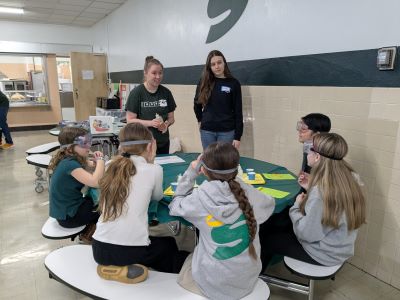
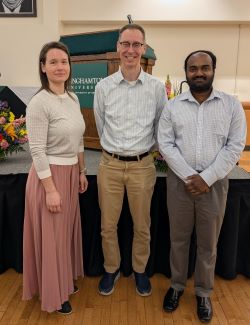
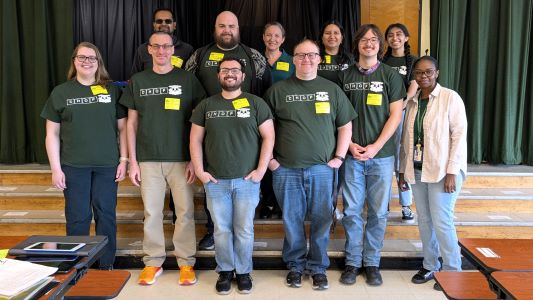
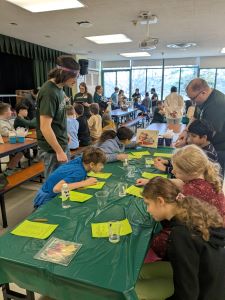
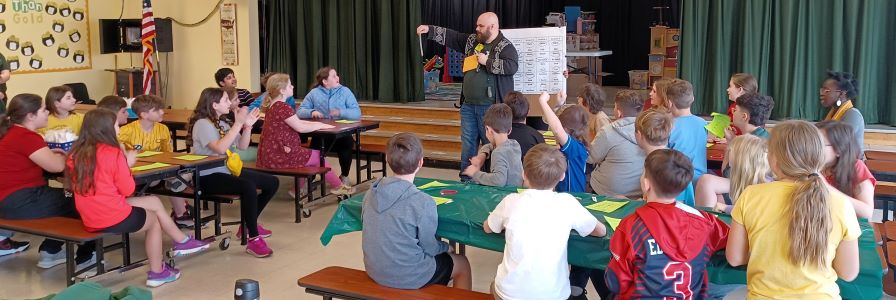
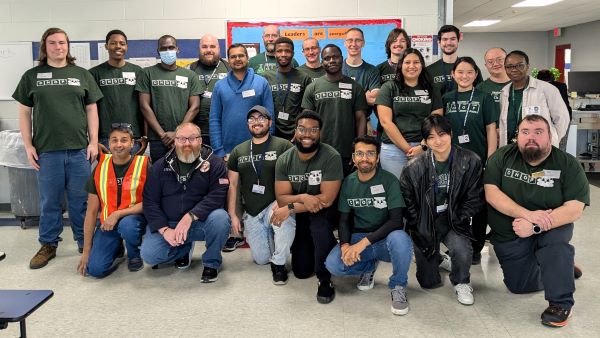
We had a lot of fun with more than 100 5th graders!
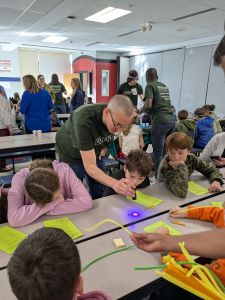
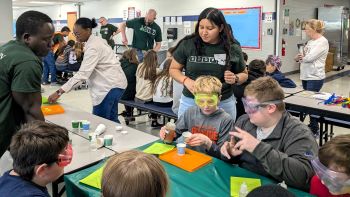
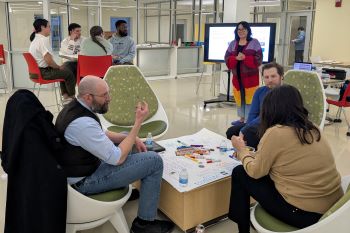
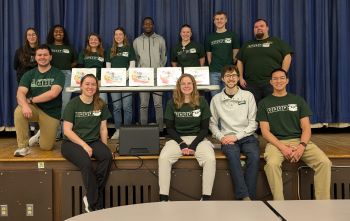
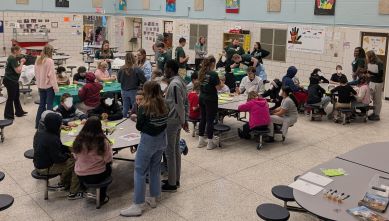


ChOP members led the Morning Outreach Event at Theodore Roosevelt Elementary on 2/19/2025.
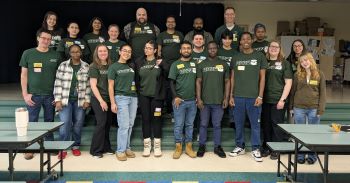
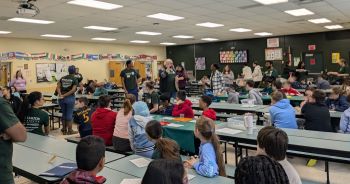

Dr. Eugene S. Stevens, a former faculty member and Chair of the Chemistry Department, died December 16, 2024, at the age of 85 in Binghamton, New York. He is survived by his son, Gregory, of Albany, New York; his sister Audrey Theis, of Portland, Oregon; sister-in-law Maxine Pysh of Merrillville, Indiana, and many nieces, nephews, grandnieces, and grandnephews. Gene was born in Carnegie, Pennsylvania on December 29, 1938. After receiving a B.S. in Chemistry from Yale University in 1960, he earned a Ph.D. in Chemistry from the University of Chicago in 1965. Following a National Science Foundation Postdoctoral Fellowship at Harvard University, he joined the Chemistry faculty at Brown University, where he was promoted to Professor of Chemistry in 1975. In 1977 he joined the Chemistry faculty at the State University of New York at Binghamton and served as the Chair of the Department from 1981 to 1983. He received many grants from the National Science Foundation and the National Institute of Health and published over 100 scientific papers on the optical properties of biopolymers and novel biodegradable plastics. He also traveled extensively to various international countries to collaborate with other scientists on biopolymers research. He enjoyed singing in choral groups, and in his youth sang with the Yale Glee Club, the Yale Russian Chorus, the University of Chicago Madrigal Society, and the Brown University Madrigal Society. From 1991 to 1996 he sang with the Tri-Cities Opera Chorus in Binghamton, New York. Gene was active in the American Chemical Society for many years. In 1988 he helped to initiate the High School Chemistry Olympiad and Science Olympiad in the Binghamton area. The Binghamton section of the ACS awarded him its Service Award in 1991 and Distinguished Education Award in 2004. As an ACS Tour Speaker, he gave many lectures across the country, and his book "Green Plastics" introduced biodegradable plastics to a large general audience. He was also a member of the American Society for Testing and Materials and the BioEnvironmental Polymer Society. Gene had a profound influence on the Chemistry Department's growth and was an extremely generous colleague who worked tirelessly for the benefit of the university. He will be missed.
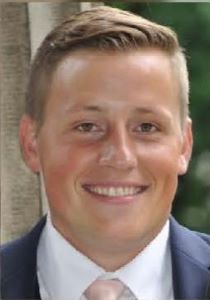
The Chemistry Department is holding two big events for prospective students interested in learning more about the Graduate Research and Educational opportunities here at Binghamton University. First is the 7th Annual Binghamton University Conference in Undergraduate and Graduate Chemistry Research held from 10am-5pm in the Smart Energy Building on November 16th. Nasa Electronics Engineer and Binghamton University Alumni, Dr. Steven J. Ambrozik, (pictured) will present his keynote lecture, "The Intersection between Binghamton University and National Space Systems." Second is the Chemistry Graduate Program & Biochemistry and Chemical Biology Graduate Program Virtual Open House held from 5pm-7pm EST on November 23rd. We look forward to seeing you!

Ilze Kumpina, a Graduate Student in Rozners lab, has received the prestigious Chu
Family Scholarship. These competitive awards were initiated by The Chu Family Foundation
and the International Society for Nucleosides, Nucleotides, & Nucleic Acids to support
the professional development of early-career level women with the potential for significant
contribution in the field of nucleoside/tide and/or nucleic acid research. Only three
scholarships from The Chu Family Foundation are given biannually to advance the careers
of early career level women by providing funds to attend a specialized workshop, visit/work
in another laboratory to obtain new skills, take a course or acquire specialized training.
Ilze received her award on September 6 at the XXV International Round Table on Nucleosides,
Nucleotides and Nucleic Acids in Tokyo.
Congratulations to Ilze on a well-deserved award!
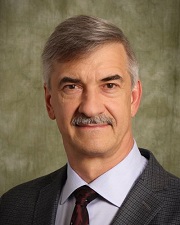
The collaboration continues a more than seven-year long partnership that has established a bridge for Elizabethtown College (a primarily undergraduate institution) students for transitioning from undergraduate studies to advanced graduate studies at a research university. Work will continue toward improving STEM education of undergraduate and graduate students, and offer unique training for graduate and postdoctoral students interested in a faculty position at a primarily undergraduate institution.
Congratulations to Eriks and his group!

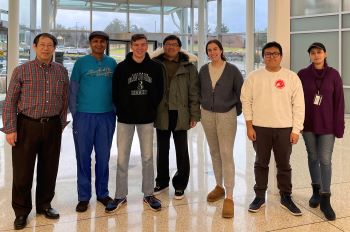
(1) the Group received a three-year standard grant from the National Science Foundation (DMR-2347030, totaling $519,236) entitled "Preventing Catalysts Degradation in Oxyegn Reduction: Harnessing Doped Pt 3 Ni(111) Facets with Pt(111)-Skin”. This grant aims to enhance proton-exchange membrane fuel cells, critical for clean energy initiatives, by improving the durability of platinum (Pt)-based electrocatalysts used in the oxygen reduction reaction at the cathode. Focusing on the Pt 3 Ni nano-octahedral catalyst, the project employs advanced surface manipulation techniques and metal dopants to achieve more enduring catalysts. By developing robust Pt 3 Ni-based electrocatalysts, the endeavor seeks to significantly enhance energy conversion processes, promoting a sustainable future.
(2) Additionally, alongside a PI collaborator, the Fang Group secured a two-year award from NYSERDA totaling $332,598. The project, titled “Perovskite Powered Hydrogen Production using Low-Cost and Earth-Abundant Catalysts”, focuses on developing perovskite solar cells, synthesizing advanced electrocatalysts, and designing and fabricating an advanced device. The primary objective is to facilitate green hydrogen generation powered by perovskite solar cells.
(3) Furthermore, the Fang group received an internal TAE award titled “A New Strategy for Developing Hydrogen Storage Materials.” This seed grant, totaling $15,000, aims to advance Mg-based materials through precise atomic-scale coating techniques. By stabilizing these materials on high-surface-area alloying and catalyzing nanocrystals, the project seeks to significantly enhance hydrogen storage capabilities, thereby enabling more efficient hydrogen adsorption and desorption in practical applications.
Introducing Sir Stanley: Binghamton professor and Nobel Prize winner knighted by King Charles
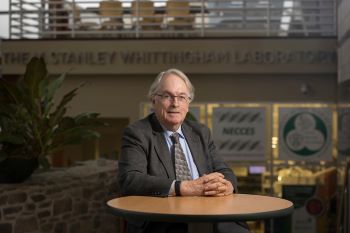
Binghamton University Distinguished Professor and Nobel Prize Laureate M. Stanley Whittingham has been named a Knight Bachelor “for his services to research in chemistry.”
The honor entitles him to be known as Sir Stanley, or Sir Stanley Whittingham, and was announced as part of King Charles III’s official birthday honours list.
Click here to read the entire atticle.
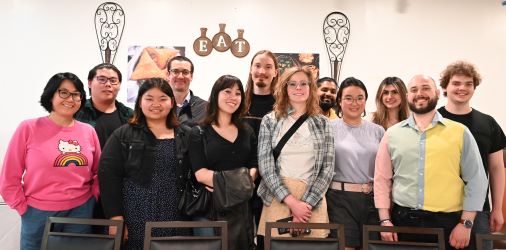
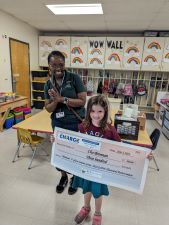




Department hike at Michigan Hollow, Danby State Forest
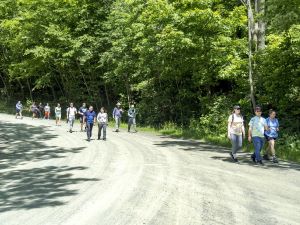
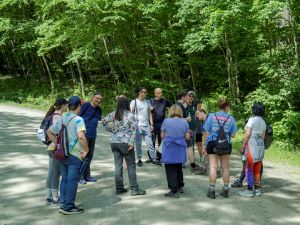

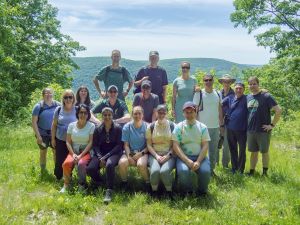
Congratulations Vince! 2024 Distinguished Service Award Recipient
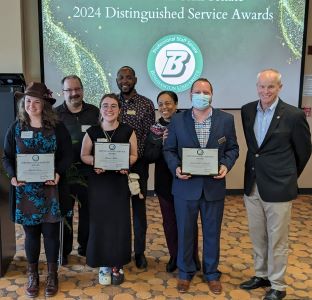
2024 Student award pictures
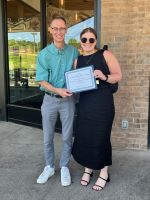
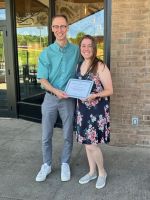
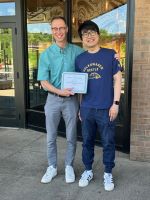
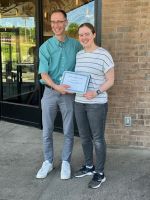
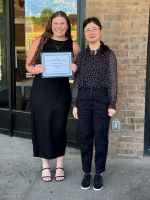
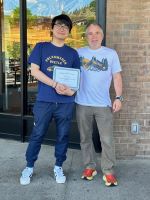
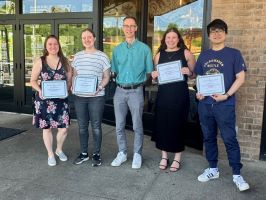
PhD Hooding Ceremony 5/9/2024
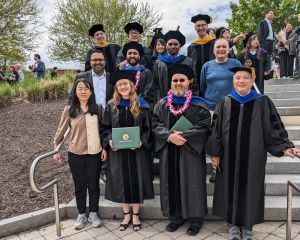
Chemistry Graduation Celebration 5/10/24
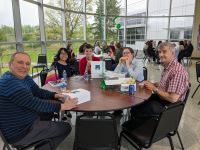


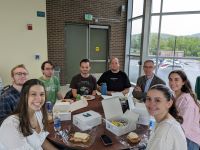
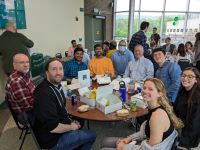


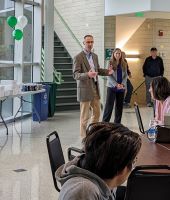


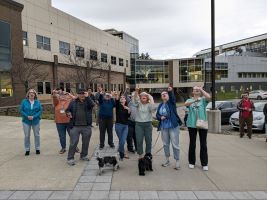



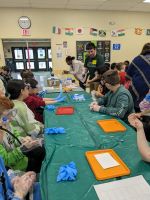
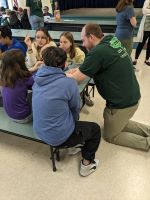
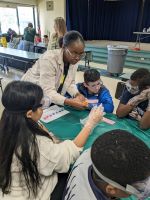
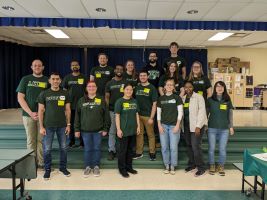
ChOP members led the Morning Outreach Event at Vestal Hills Elementary on 3/21/2024.
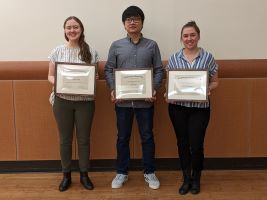
Congratulations to the Spring 2024 Awards
AWARD FOR EXCELLENCE IN TEACHING: LynnTerry
AWARD FOR EXCELLENCE IN SERVICE / OUTREACH: Kelli Moseman
AWARD FOR EXCELLENCE IN RESEARCH: Zihan Xu and Chetan Joshi
Congratulations!

Eriks Rozners’ group has renewed their Maximizing Investigator’s Research Award (MIRA
R35 GM130207) of $2,109,044 from the National Institute of General Medical Sciences
(NIGMS) to support their broad research portfolio on Chemical Approaches to Control
the Function of Regulatory RNAs. This award will support for another 5 years two long-standing
research programs in Rozners’ lab on 1) amide-modified RNA and 2) sequence selective
recognition of RNA via triplex forming peptide nucleic acids.
The goals of MIRA R35 Outstanding Investigator Awards are to increase the stability
of funding for NIGMS-supported investigators, enhance their ability to take on ambitious
scientific projects and approach problems more creatively, and increase flexibility
for investigators to follow important new research directions, while reducing the
time spent on writing and reviewing grant applications.
Congratulations to Eriks and his group!
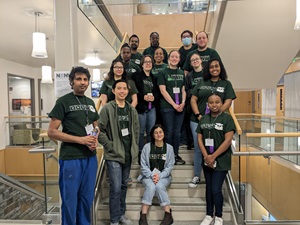
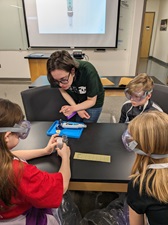
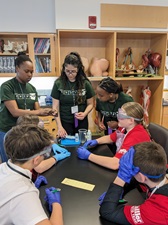
| ChOP members led the Morning Workshops at the 2024 Southern Tier Scholastic Science Fair on 3/15/2024. |
Virtual Open House, Thu, Jan 11, 9 am - 12 pm, EST
We would like to invite you to our virtual graduate student open house which is hosted by the Chemistry Graduate Program and the Biochemistry and Chemical Biology Graduate Program at SUNY Binghamton University, New York, USA (see attached flyer). The open house will be on Thursday, January 11, at 9 am - 12 pm Eastern Standard Time. Please sign up at the link below. If you are not available, please sign up too, and we will send you video content. Our priority application deadline for both graduate programs is on January 15. We are very much looking forward to welcoming you virtually on our Campus and answer any questions you may have about our two graduate programs!
Program:
1. Introduction to the Chemistry Graduate Program and the Biochemistry and Chemical Biology Graduate Program at SUNY Binghamton University by our Chairs, followed by a Q&A:
Dr. Christof Grewer, Department Chair
Dr. Jennifer Hirschi, Chemistry Graduate Program Chair
Dr. Brian Callahan, Biochemistry and Chemical Biology Program Chair
Dr. Julien Panetier, Graduate Admission Chair
2. Meetings with graduate students from your preferred Chemistry discipline
3. Individual meetings with faculty
A directory of faculty members and their research group websites can be found here:
https://www.binghamton.edu/chemistry/faculty/
4. Virtual Building Tour
Graduate Studies in Chemistry flyer
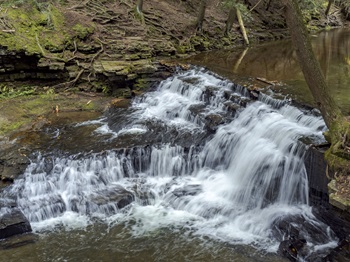
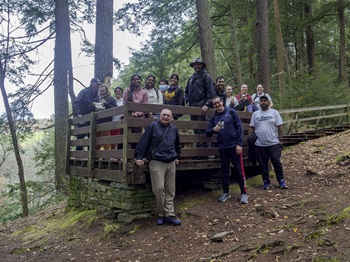
Thanks to the Wellness Team, in particular Claire Besson and Julien Panetier, for organizing the Department hike to Salt Springs State Park on 10/28/2023. Getting wet feet seems to become a regular occurance on these hikes. See all the pictures from the hike.

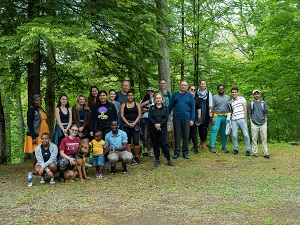
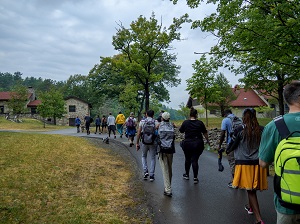
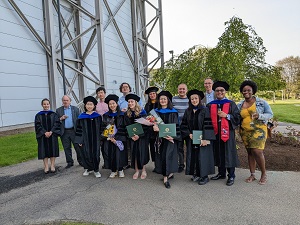
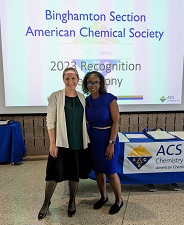
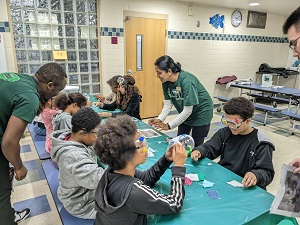
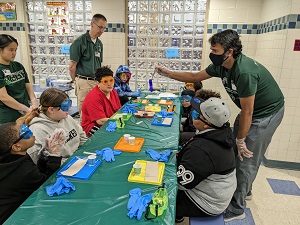
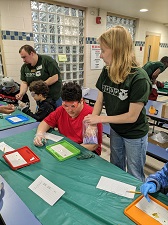
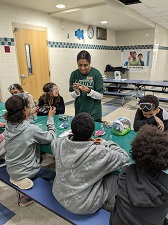
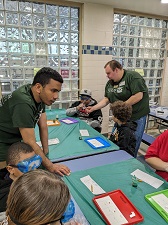
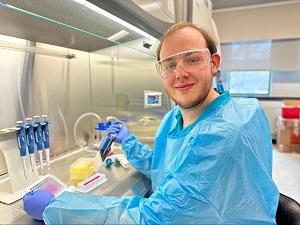
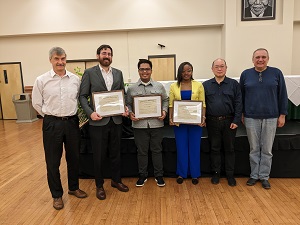
AWARD FOR EXCELLENCE IN TEACHING: Faith Wachira
AWARD FOR EXCELLENCE IN SERVICE / OUTREACH: Ezer Castillo and Victoria Kompanijec
AWARD FOR EXCELLENCE IN RESEARCH: Christopher Ryan
Congratulations!
Binghamton researchers among top 2% in the world
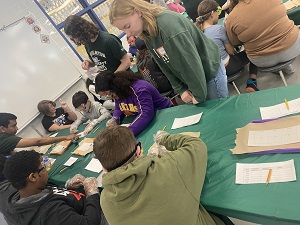
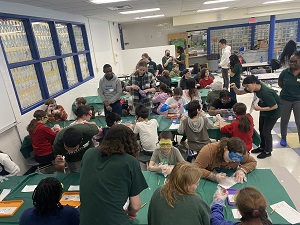
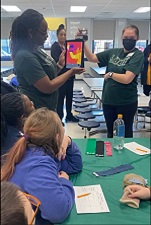
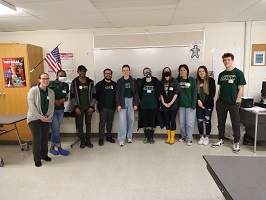
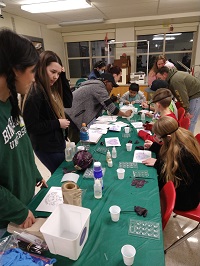
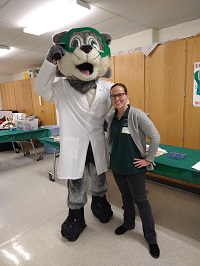
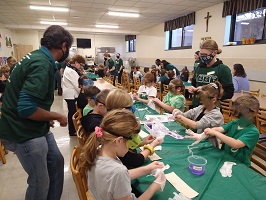
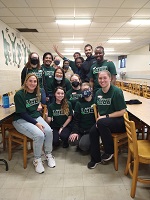
Grad Students and Staff at the Outreach Visit to St. John's Elementary School in Binghamton, NY.
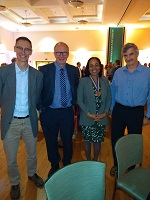
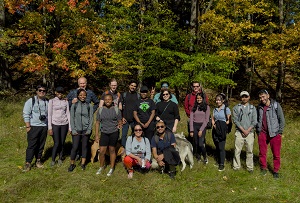
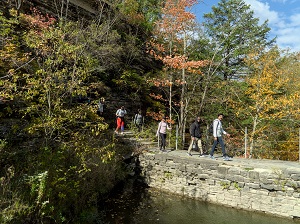
Department's Hike to Buttermilk Falls on Oct 15.
See all the pictures from the hike.
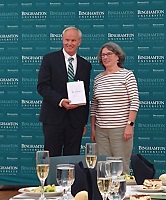
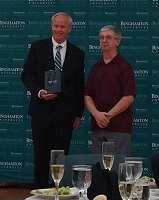
President Stenger recognized the long service of Mary Bridge and Robert Kematick at the Retirement Luncheon on September 27, 2022.

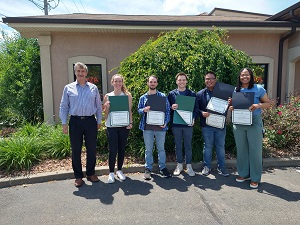
Congratulations to the winners of 2022 Graduate Student Excellence Awards:
Brandon Tessier - Lois Mackey Award
Victoria Kompanijec - Outstanding Service and Outreach Award
Justine Gordon and Ezer Castillo - Outstanding Teaching Assistant Award
Daniel Ciulla and Ezer Castillo - Outstanding Research Assistant Award

Alexsa Silva has received the Chancellor’s Award for Excellence in Professional Service. Congratulations Alexsa!
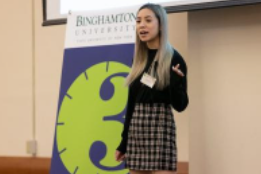
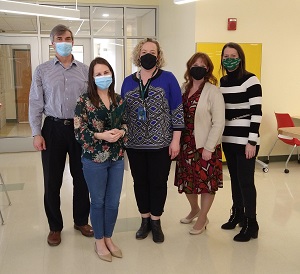

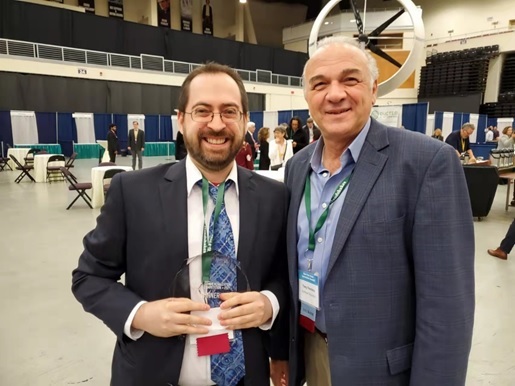
Binghamton University smart energy start up wins competition
FuzeHub Commercialization Competition is intended to help small-sized manufacturing and technology companies strengthen their “go-to-market” strategies as they move from new product/production method to marketplace. Dominic Caracciolo, CEO of DomCat Technologies, a recent startup spinoff from Zhong Research Group at Binghamton University, and Chemistry graduate student, successfully pitched at this event and won $50,000 for DomCat to pursue commercialization of a patented fuel cell catalyst technology developed at Binghamton University. This entrepreneurship effort was built upon the team’s initial pitch experience at FuzeHub 2018 and accelerated by recent market findings from the projects funded by NSF I-Corps and Binghamton University XCEED. DomCat’s team is excited about winning the competition and ready to pursue the business plan and bring the fuel cell technology to the clean and sustainable energy market.

POWERED BY CURIOSITY: ALUMNA AND LEADING BATTERY RESEARCHER JIE XIAO
Jie Xiao came abroad to Binghamton to study chemistry with Distinguished Professor M. Stanley Whittingham. Read more here: LEADING BATTERY RESEARCHER JIE XIAO
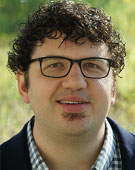
John Swierk’s research group has been awarded an NIH grant.
John Swierk’s research group has been awarded an NIH grant (1 R15 GM140404-01) dealing with tattoo photochemistry ($450,480 in total). Despite the growing popularity of tattoos and massive economic footprint of laser tattoo removal, how light changes tattoos and what corresponding risks are introduced are poorly understood. Over the next 3 years, the Swierk group plans to map out what tattoo inks photodegrade into and what risks those photodegraded products pose to humans. Studies are also planned to understand how laser tattoo removal degrades tattoos, which may lead to better and more effective methods. Collaboration with Prof. Laura Rhoads (SUNY Potsdam) will allow the group to study the photochemical effects of tattoo in model biological systems.”

Fang Group
Having prepared for a long time, Fang group recently published a comprehensive review article, “Noble-Metal Based Random Alloy and Intermetallic Nanocrystals: Syntheses and Applications” in the prestigious ACS journal, Chemical Reviews (Impact Factor 2019: 52.758) that receives exceptionally high citation numbers. The article outlines random alloy and intermetallic nanocrystals from their structure, synthesis to their applications, and addresses their prospects and current challenges in terms of the controlled synthesis. This article, as part of thematic issue “Advanced Materials and Methods for Electrocatalysis by Transition Metals”, was invited by the Chem. Rev. editors and has been prepared since last fall.
“Noble-Metal Based Random Alloy and Intermetallic Nanocrystals: Syntheses and Applications”, Ming Zhou, Can Li, and Jiye Fang, Chem. Rev., 120 (2020). https://doi.org/10.1021/acs.chemrev.0c00436
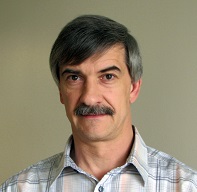
Eriks Rozners wins the 2021 Melville L. Wolfrom Award
Eriks Rozners, Professor and Chair of Chemistry has been selected to receive the 2021 Melville L. Wolfrom Award from the Division of Carbohydrate Chemistry, American Chemical Society. The Melville L. Wolfrom Award recognizes individuals who have provided outstanding service to the Division of Carbohydrate Chemistry and the field of carbohydrate chemistry. Professor Rozners will receive the award during the ACS National Meeting next March in San Antonio.
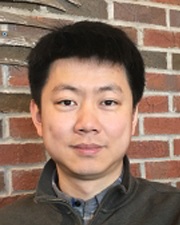
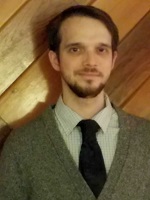
Dan Ciulla, first recipient of the prestigious John Eisch Summer Fellowship.
Congratulations to Dan Ciulla, 2nd year PhD student (Callahan Group), as the first
recipient of the prestigious John Eisch Summer Fellowship. Following the example set
forth by Professor Eisch, Dan is a dedicated scholar, tireless worker and fearless
experimentalist. Dan fully embodies the theme of the John Eisch Summer Fellowship:
Chemical Research Beyond Expectation.
Despite a relatively short time in our Chemistry PhD program, Dan already has 5 peer-reviewed
publications, a list that includes two first-author publications, one in JACS and
one in ChemComm, and a co-first author publication, also in JACS. Dan’s first-author
paper in JACS was selected by the journal editors as the cover feature!
In his most recent work, Dan is applying the revolutionary CRISPR/Cas gene editing
technology as a means toward discovering new and more effective cancer therapies.
Dan’s newly created research tools have paved the way for an exciting collaboration
focused on cancer drug discovery involving the Callahan lab and the National Institutes
of Health.

Maureen Kitheka, a third-year Ph.D. student in the Goyal group, has been awarded a Frontera Computational Science Fellowship for 2020-2021 by the Texas Advanced Computing Center (TACC) in order to carry out research on charge transport in organic battery materials. As part of this fellowship, Maureen will receive 50,000 node-hours on Frontera, paid summer residence at TACC, training on the latest tools in advanced computing, and collaboration/networking opportunities. She will also receive an annual stipend of $34,000 and support for travel to a Frontera user community event and/or professional conference. Congratulations Maureen!
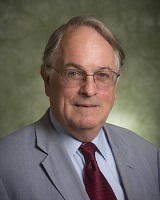
Stan Wittingham receives 2019 Nobel Prize in Chemistry
The 2019 Nobel Prize in Chemistry has been awarded to M. Stanley Whittingham, distinguished professor of chemistry and materials science at Binghamton University, State University of New York.Whittingham won the prize for pioneering research leading to the development of the lithium-ion battery along with John B. Goodenough, Virginia H. Cockrell Centennial Chair in Engineering at the University of Texas at Austin, and Akira Yoshino of Meijo University in Japan. Congratulations to Stan!

Grewer laboratory receives major NIGMS grant
Dr. Grewer's laboratory has been awarded a NIH grant (1 R15 GM135843-01, $450,480, three years) with the title "How to Combat Glutamate Release by Reverse Transport: Mechanistic Studies and Development of Selective Efflux Inhibitors." This grant will support research on the mechanism of how the major excitatory neurotransmitter glutamate is released into the extracellular space in the brain, by reverse transport through glutamate transporters. In addition, new avenues will be explored of how to selectively block glutamate release using pro-drug inhibitors. Glutamate release by neurons is important because glutamate becomes an excitotoxin, when present in the extracellular space of the brain in high concentrations. Such pathophysiological conditions are often encountered after a stroke, when glutamate induces irreversible neuronal cell death. The proposed research aims at understanding the glutamate release process and potentially preventing it through pharmacological intervention.

Grewer laboratory receives collaborative NIH award with Mount Sinai School of Medicine
Christof Grewer's group has received a four-year NIGMS award in collaboration with Dr. Avner Schlessinger's laboratory at Mount Sinai School of Medicine (9 R01 GM108911-06A1, Schlessinger, PI, $81,024 total costs per year sub-contract to Grewer lab) with the title "Substrate Specificity Determinants in Cancer-related Solute Carrier Transporters." The glutamine transporter ASCT2 has been shown to be of major importance in glutamine homeostasis in rapidly-growing cancer cells, resulting in "glutamine addiction" of these cells. This is the second R01 grant funding the long-standing collaboration between the Grewer and Schlessinger laboratories. The major goals of this project are to characterize glutamine transporter ASCT2 substrate and inhibitor specificity using computational and experimental approaches, and to develop specific ASCT2 inhibitors with high affinity, as pharmacological tools and anti-cancer reagents.

John Swierk's Group Receives Doctoral New Investigator Award
John Swierk’s group has received a Doctoral New Investigator Award from the American Chemical Society ($110,000 for 2 years) to investigate methods for using visible light to desulfurize fuels. Sulfur-containing molecules represent a major source of pollution in fuels and their removal during the refining process is inefficient and energy intensive. The grant will investigate molecules that selectively bind sulfur-containing impurities and then subsequently transform those molecules into an easily removed form using only light and oxygen.
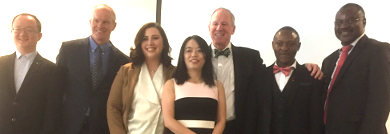
2019 Graduate Student Excellence Awards
On March 27, 2019, 4 of our graduate students were presented with certificates in recognition of their outstanding contribution to the excellence of Binghamton University. Our recipients are:
- Yiliang Luan - Graduate Student Award for Excellence in Research
- Lynn Schmitt - Graduate Student Award for Excellence in Teaching
- Victor Wambau - Graduate Student Award for Excellence in Teaching
- Shan Yan - Graduate Student Award for Excellence in Research
Photo: Yiliang Luan, President Stenger, Lynn Schmitt, Shan Yan, Probost Nieman, Victor Wambau, Dean Tarhule
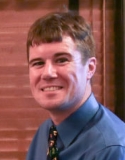
Alumnus Jared DeCoste Named Maryland Chemist of the Year
Jared DeCoste, Ph.D., a graduate of the Chemistry program here at Binghamton and now a scientist at the U.S. Army Combat Capabilities Development Command (CCDC) Chemical Biological Center has been named Maryland Chemist of the Year by the American Chemical Society.
Jared received the prestigious award for to his efforts to further the understanding and development of metal organic frameworks (MOFs) for chemical, biological, radiological and nuclear (CBRN) defense applications. For the past eight years, DeCoste has been a leader in MOF research with the goal of protecting Soldiers from CBRN threats on the battlefield.
Congratulations to Jared on his excellent work!

Eriks Rozners' Group Receives NIGMS Award
Eriks Rozners’ group has received a Maximizing Investigators' Research Award (MIRA R35 GM130207, $2,040,290 for 5 years) from the National Institute of General Medical Sciences (NIGMS) to support their broad research portfolio on Chemical Approaches to Control the Function of Regulatory RNAs. This award will support two long-standing research programs in Rozners’ lab on amide-modified RNA and on sequence selective recognition of RNA via triplex forming peptide nucleic acids.
The goals of MIRA R35 Outstanding Investigator Awards are to increase the stability of funding for NIGMS-supported investigators, enhance their ability to take on ambitious scientific projects and approach problems more creatively, and increase flexibility for investigators to follow important new research directions, while reducing the time spent on writing and reviewing grant applications. The current award to Rozners’ group is the first R35 award received by Binghamton University.
Congratulations to Eriks and his group!

James Fang Receives DOE EFRC Grant
James Fang has received a $400,000 research grant over four years from the U.S. Department of Energy (DOE) through the Center for Alkaline-Based Energy Solutions (CABES), led by Professor Abruña at Cornell University, Ithaca, New York. The CABES is one of the 22 new Energy Frontier Research Centers (EFRCs) that received four-year awards. The mission of CABES is to achieve a detailed understanding of the nature, structure, and dynamics of electrocatalysis in alkaline media.
Congratulations to Dr. Fang!

Stan Whittingham Awarded the 2018 David Turnbull Lectureship
Stan Whittingham has been awarded the 2018 David Turnbull Lectureship by the Materials Research Society (MRS). The Turnbull Lectureship is given to recognize the career of a scientist who has made outstanding contributions to understanding materials phenomena and properties through research, writing, and lecturing.
Stan was chosen from a group of outstanding nominees for "fundamental contributions to solid state ionics including the discovery of the key role of intercalation mechanisms, and the development and commercialization of rechargeable Li-ion batteries.” The award will be presented at the 2018 MRS Fall Meeting in Boston, at the Awards Ceremony on Wednesday, November 28, 2018, at 6:15 p.m.
Congratulations to Stan!

James Fang Awarded Major NSF Grant
Dr. Fang has been awarded a research grant from the National Science Foundation (NSF) (1808383, $504,124 for 3 years) to support his work for the development of catalytic sites with lattice strain that exists in several types of shape-controlled state-of-the-art nanocrystals as the model systems. This project aims to explore some fundamental understandings of the lattice strain formation and solutions of catalytic improvement of some emergent electrochemical reactions in energy conversion and environmental protection.
Recently, Dr. Fang also received a grant totaling $110K from the ACS Petroleum Research Fund,entitled “Ceria Facet-Dependent Oxidative Coupling of Methane towards C2 Products”. This is the second-year’s support of the two-year “New Direction” grant, initially awarded on 9/1/2017. This project is aimed at the methodological development of facet-tailored CeO2 synthesis, and the observation of CeO2 facet stability as well as facet-dependent CH4 conversion/C2 selectivity.
Congratulations to Dr. Fang!